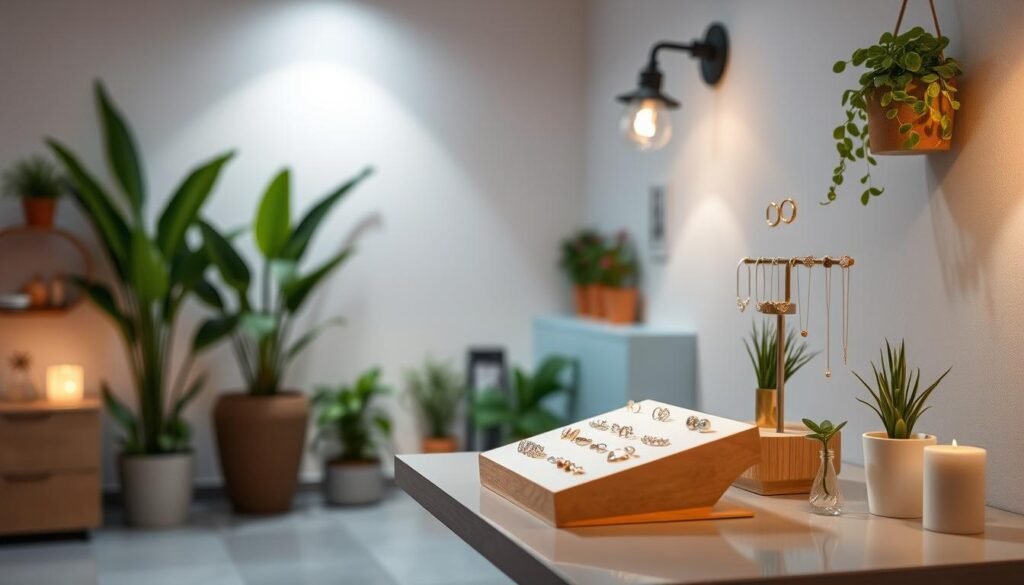About 35% of ear piercings might cause infections or complications. Even with this risk, many people are now getting ear piercings to fight anxiety. They think it can relieve stress, kind of like acupuncture does. This interesting blend of body decoration and mental health needs a closer look.
Nowadays, people are leaning towards natural ways to manage anxiety. Piercings in the daith and shen men spots are getting popular for this reason. We’ll look into what science says about these piercings helping with anxiety. It’s key to do your homework and get advice from experts.
Key Takeaways
- The connection between ear piercings and anxiety relief is underexplored and primarily anecdotal.
- Research suggests potential benefits from stimulating the vagus nerve through methods like acupuncture and possibly ear piercings.
- Risks associated with ear piercings include a high rate of infection and other complications.
- No concrete scientific evidence currently validates daith or shen men piercings as effective treatments for anxiety.
- People interested in holistic anxiety management are encouraged to consult healthcare professionals before opting for such treatments.
The Connection Between Ear Piercing and Anxiety Relief
Ear piercing therapy has become a popular way to deal with anxiety without medication. It attracts people who want a different approach to treat their anxiety. Specifically, daith piercing is thought to help by activating certain pressure points, similar to acupuncture.
The link between ear piercings and easing anxiety mostly comes from personal stories. Some research notes that piercings, especially daith ones, might help reduce migraines which anxiety can trigger. Yet, solid scientific proof is still lacking, leaving some doubt about how effective piercings really are in fighting anxiety.
Those thinking about getting their ears pierced for anxiety should know the risks. About 35% of these piercings can lead to pain, allergies, or infections. Since daith piercings pierce the ear’s cartilage, they take longer to heal, which might make complications more likely.
After getting an ear piercing, taking good care of it is key. People should wash their hands often, use saline solutions, and avoid touching the piercing. This will help prevent problems and promote faster healing.
Before choosing ear piercing as an anxiety treatment, it’s important to consider both the good and bad. Talking to a trusted professional can help determine the best approach and ensure a safe piercing experience.
Understanding the Daith Piercing for Anxiety
The daith piercing is found in the inner part of the ear. It’s known for possibly easing anxiety by targeting a certain nerve. This spot is thought to press on the vagus nerve, possibly lowering anxiety and migraine symptoms. This idea is similar to acupuncture, which stimulates certain points for health.
Location and Mechanism of Action
The daith piercing is above the ear canal, among twelve cartilage piercing types. Some think it can quickly ease general anxiety, better than some usual treatments. Yet, no medical proof confirms it reduces anxiety.
Benefits and Anecdotal Evidence
Many say daith piercings notably reduce their anxiety. A survey found 75% with fewer migraine symptoms after getting one. These benefits come from personal stories, not solid science. There haven’t been clinical trials on daith piercings for anxiety. Some find relief, but experts, like the American Migraine Foundation, are cautious due to infection risks and lack of concrete proof.
| Aspect | Finding |
|---|---|
| Patient Improvement | 75% reported improvement post-daith piercing |
| Prevalence of Piercings | 42% of men and 60% of women among US graduate students |
| Complications | Up to 35% of ear piercings can develop complications |
| Scientific Support | No formal research backing effectiveness for anxiety |
| Healing Time | Approximately 5 to 12 months |
Daith piercings for anxiety are getting more popular. But it’s key to think about expert advice and proven treatments too. Talking to a doctor can help plan the best way to handle anxiety. For more information, check out this article.
Ear Piercing for Anxiety: Natural Stress Relief Method
Many people nowadays are looking at natural ways to fight anxiety and depression. Ear piercing is one way that’s gaining popularity as a piercing as a calming technique. This trend shows more people are trying new methods to feel better mentally.
Some special piercings, like the daith, tragus, and conch, are in the spotlight for possibly helping with anxiety. Even though there’s not much scientific proof yet, stories from people suggest they feel better after getting these piercings.
Before jumping into ear piercing for anxiety, it’s smart to talk with a health expert. Each person is different, and what works for one might not for another. Knowing this helps in making well-informed decisions about using piercings for relaxation.
If you’re thinking about ear piercing to manage anxiety, remember to care for your piercing well. Also, pick a trusted piercing place. These steps will help reduce any risks and make your piercing experience positive.
Looking at ear piercing as an extra help for mental health is catching on. It could be a supportive choice for those exploring new ways to deal with anxiety. For deeper knowledge on natural anxiety solutions, check out this comprehensive guide.
| Piercing Type | Potential Benefits | Anecdotal Evidence |
|---|---|---|
| Daith | May alleviate anxiety and migraines | Reported improvements in anxiety symptoms |
| Tragus | Stimulates pressure points for stress relief | Some individuals claim benefits |
| Conch | Associated with relaxation techniques | Positive personal experiences noted |
The Role of the Vagus Nerve in Anxiety Management
The vagus nerve is key in controlling our feelings and stress levels. It helps us understand ways to ease anxiety, including a type of ear piercing. The daith piercing, near the vagus nerve, helps calm the body and mind.
How Piercing Stimulates the Vagus Nerve
Ear piercing, especially the daith piercing, may activate the vagus nerve. This could reduce anxiety by encouraging the body to relax. Activating the nerve helps slow down the heartbeat and brings a sense of peace.

Comparative Insights from Acupuncture Studies
A study in London compared ear piercing to acupuncture for stress management. They found that daith piercings improved headaches in many patients over several months. This suggests that piercings might work similarly to acupuncture.
Daith piercings are also close to acupuncture points, which might explain their positive effects on mood and anxiety. 87% of patients felt happier after getting pierced. Yet, we need more studies to prove if this treatment truly works for anxiety.
Exploring Other Types of Ear Piercings for Anxiety Relief
The shen men piercing is becoming popular for those looking for new ways to treat anxiety. It’s found near the top of the ear. Many believe it helps like the daith piercing does, especially with migraine and anxiety. Knowing how the shen men piercing works might show how it helps with stress.
The Shen Men Piercing and Its Potential Benefits
This piercing touches an acupressure point used in ear acupuncture for stress relief. People have been exploring ear acupuncture for more than two hundred years, showing its importance. Many share stories that the shen men piercing boosts their well-being and calms anxiety. They feel more relaxed and focused after getting the piercing, sparking interest in ear piercings for health.
Comparison Between Shen Men and Daith Piercings
The shen men and daith piercings aim to ease anxiety but in different spots on the ear. They press on specific points. The daith piercing is known to help with migraines and anxiety. On the other hand, the shen men piercing might improve emotional well-being and stress control. Here’s a table to show the differences:
| Type of Piercing | Location | Potential Benefits |
|---|---|---|
| Shen Men Piercing | Top of the ear | Potential anxiety relief, emotional balance |
| Daith Piercing | Inner cartilage of the ear | May reduce migraines, anxiety symptoms |
As people look into ear piercings for anxiety help, they find more natural remedy options. Learning about different piercings like the shen men offers an exciting chance. People seeking new anxiety treatments now have more choices than typical methods.
Natural Remedies for Anxiety: Comparisons and Considerations
Exploring natural remedies for anxiety opens up many choices. Ear piercings like tragus and daith are holistic methods. They are one option among many. Finding a combination of strategies often works best for individuals seeking relief.
Alternative Anxiety Treatments Overview
Several alternative treatments have become popular lately. Techniques such as mindfulness meditation help create calm and lessen anxious feelings. Herbal treatments, including chamomile and valerian root, offer soothing effects. Acupressure is another option, providing relief by pressing specific body points.
Holistic Approaches Beyond Piercing
A comprehensive strategy is key for managing anxiety. Practices like yoga and meditation improve both mind and body health. Changing your diet can also help balance your mood. Using holistic approaches alongside piercing offers a complete solution for anxiety management. It empowers people to improve their mental health.
| Treatment Method | Description | Potential Benefits |
|---|---|---|
| Mindfulness Meditation | A practice focusing on being present in the moment. | Reduces stress, improves concentration. |
| Herbal Treatments | Using natural herbs for calming effects. | May alleviate anxiety and improve sleep quality. |
| Acupressure | Applying pressure to points on the body. | Secures momentary relief from anxiety and tension. |
| Yoga | A physical and mental practice emphasizing breath control. | Enhances relaxation, flexibility, and strength. |
| Nutritional Changes | Adjusting diet for better mood support. | Encourages stable energy levels and emotional balance. |
Considering various methods is crucial for those exploring natural anxiety remedies. Ear piercings might help, especially when combined with other holistic strategies. For more details about ear piercings and their relaxation benefits, visit this source.

Considerations Before Getting an Ear Piercing for Anxiety
Considering an ear piercing for anxiety relief? Think about a few things first. The side effects and risks of ear piercing could change how you feel about it. While the idea may seem good, it’s key to balance these risks with the possible benefits.
Side Effects and Risks to Keep in Mind
Piercings can have risks. For example, a simple lobe piercing might hurt a little, around 2 out of 10. But a snug piercing could hurt a lot more, like 8 out of 10. Lobe piercings heal in about six weeks, but cartilage piercings need six months or more.
- Side effects like redness, swelling, and soreness can last up to a week.
- Infections are a big risk, especially with longer healing times for cartilage piercings.
- People prone to keloids might get bumps or weird scars.
Despite concerns, nearly half of those worried still go for it. Many try to see the funny side to stress less. Knowing the risks of ear piercing helps make a smart choice.
Importance of Choosing a Reputable Studio
Picking a good piercing studio is key to avoid risks. A pro piercer will keep things clean and safe, lowering the chance of infections. Before you get pierced, make sure to:
- Check the studio’s license and read reviews from customers.
- Ask how to take care of your piercing at home.
- Talk about how much it might hurt and how to deal with it.
Knowing all about the emotional and physical parts can make your piercing experience better. It could even help you feel less anxious.
Understanding the Placebo Effect in Ear Piercing for Anxiety
The placebo effect is big in ear piercing for anxiety relief. When people think ear piercing will help, they often feel better. This belief can make them feel more at ease and in control.
Studies show people often feel better after getting their ears pierced. They think the piercing will help, which plays a big part in how they feel. Mindset is key in dealing with anxiety. Even though daith piercings are popular for stress relief, there’s not much science to back them up yet.
Below is a comparison detailing aspects of ear piercing therapy and the placebo effect:
| Aspect | Ear Piercing Therapy | Placebo Effect |
|---|---|---|
| Expectation of Relief | High – many believe it aids in anxiety | High – confidence in treatment leads to perceived relief |
| Scientific Evidence | Limited – mostly based on anecdotal reports | Well-documented – shows significant results in various treatments |
| Duration of Effects | Variable – can depend on individual circumstances | Often temporary – effects may diminish over time |
| Personal Experience | Empowering for self-expression and identity | Varies – subjective perceptions affect individual outcomes |
Learning about the placebo effect in ear piercing shows how beliefs can alter anxiety relief experiences. Even without much scientific proof for piercings like the daith, the mental benefits can enhance the experience for many. They look for natural anxiety solutions.

Next Steps After Deciding to Get Pierced
After choosing to get an ear piercing, it’s key to care for it well. Good aftercare helps heal and prevent infection. It also makes the ear piercing journey better. Here are the main steps to follow:
Post-Piercing Care and Management
To help the pierced area heal, keep it clean. Here are some important tips:
- Clean the area daily with saline solution or a mild soap recommended by professionals.
- Avoid touching the piercing with unwashed hands to prevent bacteria transfer.
- Keep hair and accessories away from the site to minimize irritation.
- Follow any specific guidelines provided by the piercer to ensure optimal healing.
Talking to health experts is also a good move. Getting a consultation with health professionals gives you advice that fits your needs. It helps you see how piercing can help with anxiety. Make sure to discuss any health issues you have with them.
Consultation with Health Professionals
Before getting pierced, speak with healthcare pros. They can share important info on:
- Your overall health condition and any medications that may affect the healing process.
- Appropriate numbing agents like Zensa Numbing Cream with 5% lidocaine to manage pain during the procedure.
- Recommendations on managing anxiety and stress related to the piercing experience.
Talking deeply with health pros about these topics helps you make safer choices. It’s crucial to look at all aspects for a good piercing outcome. It helps you feel better emotionally too. Using natural remedies, like essential oils, can make you more relaxed and less anxious. To learn more about how aromatherapy can help with anxiety, see this detailed guide.
Conclusion
Looking into ear piercing for anxiety, like the daith piercing, is an interesting option for holistic anxiety care. Though people have shared positive stories, these benefits aren’t yet proven by science. More research, especially on daith piercings, is needed.
Those thinking about ear piercing for anxiety should be aware of the risks. The healing can take a long time, from four months up to a year. There can be issues, mainly with cartilage piercings. It’s key to talk to a health expert for advice tailored to you. Trying other treatments along with piercings can help manage anxiety better.
Ear piercings for anxiety can be a part of a larger treatment plan. To tackle anxiety effectively, it’s crucial to get advice from professionals. This ensures you’re taking the best steps towards emotional health.